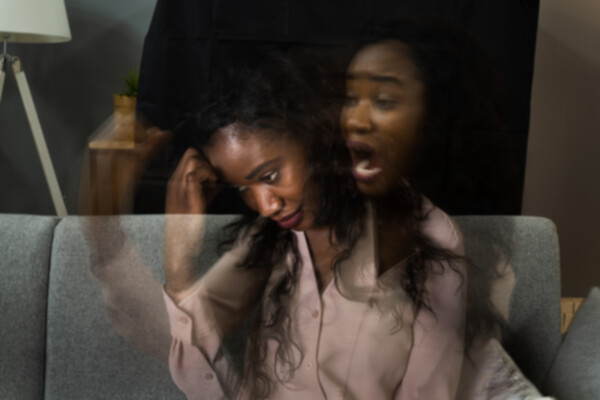Do you know paranoid schizophrenia, one of the most common types of schizophrenia? Discover the main symptoms of paranoid schizophrenia and how to help a person who suffers from it.

Schizophrenia is a type of psychosis, which means that the person who suffers from it believes that their perceptions are reality, even though they are different from what others see. In this way, the schizophrenia symptoms They affect both the thoughts and attitude of an individual. These pathologies usually begin to emerge during the last years of adolescence or the first years of adulthood.
Normally, most people who suffer from this disease usually have paranoid schizophrenia, that is, they coexist with hallucinations linked to feelings of persecution by third parties. This condition makes them suspicious of those around them, which leads to them losing opportunities on a personal and professional level.
What is paranoid schizophrenia?
The disease of paranoid schizophrenia It is mainly characterized by the positive symptoms of schizophrenia, that is, those that are psychotic and produce a distortion of reality such as delusions and hallucinations.
These symptoms of paranoid schizophrenia They tend to make people who suffer from it not know how to differentiate between what is real and what is not, which ends up causing havoc in all areas of their lives.
Paranoid schizophrenia is of all types of schizophrenia the most common and usually develops between the ages of 18 and 30.
Symptoms of paranoid schizophrenia
The first symptoms of paranoid schizophrenia They can be explained by a wide variety of factors. These include socializing less with friends, sleeping difficulties, more irritability among others. Normally, during the first symptoms of paranoid schizophrenia, the so-called negative symptoms are usually more characteristic, these include having less motivation, losing the ability to pay attention and social isolation.
When they start positive symptoms of paranoid schizophrenia This is when it can be determined that you suffer from this disease. Among the most persistent symptoms of schizophrenia, psychologists highlight the following in order to identify it.
- Hallucinations: The main symptom of paranoid schizophrenia It is suffering from a series of hallucinations that can end up seeing, hearing, feeling and tasting things that other people cannot.
- Suspicious of others: In many cases, people who suffer from paranoid schizophrenia They often have negative thoughts that lead them to think that others have negative intentions towards them. Hence, people who suffer from it are often labeled as paranoid.

- Uncommon and persistent thoughts or beliefs: The people that have paranoid schizophrenia They usually have a series of beliefs or thoughts that are otherwise perceived as ‘strange’. Furthermore, they tend to be deeply rooted in their values and behaviors.
- Emotional and mental dullness: People with these types of schizophrenia They usually have many difficulties relating to others and thinking clearly.
- Social isolation: Their beliefs, negative thoughts towards others and their delusions or hallucinations are usually factors that lead the person who suffers from paranoid schizophrenia to let go of their relationships.
Suffering from all of these symptoms does not necessarily indicate that you can suffer from paranoid schizophrenia, but they are indications that, if met, should be consulted with a professional psychologist. In many cases, early intervention for schizophrenia can result in many advantages for those who suffer from it.
Once the first phases of schizophrenia (where the positive symptoms of this are experienced), the affected person ends up experiencing delusional thoughts and distortions of perception. This can lead to a deterioration in motor and cognitive functions that prevent normal development in daily tasks.
The paranoia experienced in this mental illness usually comes from beliefs and delusions that despite evidence that they are not real, they tend to persist. Furthermore, these may be accompanied by hallucinations and may be persecutory or threatening in nature for the person experiencing it.
Treatment of paranoid schizophrenia
Although there is no cure for paranoid schizophrenia, there are different treatments that can help the person who suffers from it. Mainly, antipsychotics are usually prescribed to calm the hallucinations and delusions that they may suffer from.
Besides, the schizophrenia, be paranoid Like the other types, they must be treated with a mental psychology professional who will help the person who suffers from it to obtain a series of tools to deal with all their symptoms.
How to help a person suffering from paranoid schizophrenia?
It is important that the people who are around someone who suffers from paranoid schizophrenia Help and understand what this disease means. To do this, psychologists provide the following advice.
- Establish a routine: For those who suffer from symptoms of paranoid schizophrenia It is highly recommended to establish a series of healthy habits and routines that will help discern reality and the hallucinations or delusions that this disease entails.
- Listen: Despite delusions or hallucinations Of those who suffer from paranoid schizophrenia symptoms are usually very evident, it is important not to argue them, as this could contribute to the person not telling their feelings about it. Therefore, you should listen to what they say even if their attitude is ‘paranoid’.

- Give them their space: Another important point is knowing how to leave space for those people who suffer from these types of delusions or auditory hallucinations sensitive or visual.
- Help them create a plan: During the moments where the paranoid person If you are not suffering from it, it is important to try to establish an action plan to be able to cope with the effects of this type of delusions or hallucinations.
- Push him to take care of himself mentally and physically: Finally, if you want to help a person experiencing a paranoid schizophrenia It is vital to try to take care of yourself mentally and physically. In this way, exercise and a healthy diet, as well as introspection or inner work, should be fundamental in the life of someone who suffers from it.
Although the paranoid schizophrenia is chronic That is to say, there is no cure for this disease, you can live a full life despite it. Therefore, psychiatric and psychological treatment must be constant in these cases.








